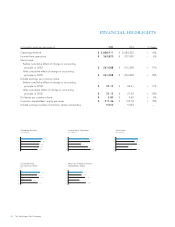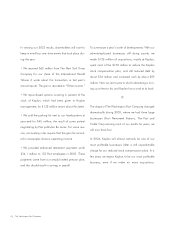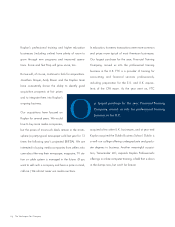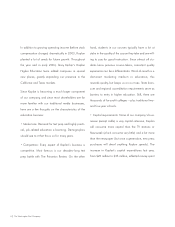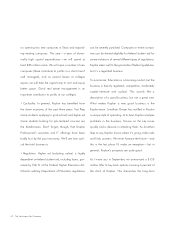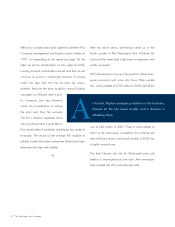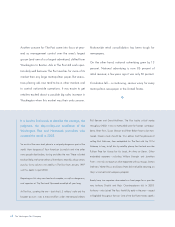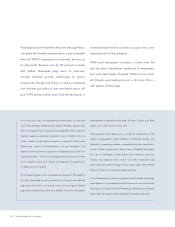Washington Post 2003 Annual Report Download - page 8
Download and view the complete annual report
Please find page 8 of the 2003 Washington Post annual report below. You can navigate through the pages in the report by either clicking on the pages listed below, or by using the keyword search tool below to find specific information within the annual report.
on opening two new campuses in Texas and expand-
ing existing campuses. This year—a year of abnor-
mally high capital expenditures—we will spend at
least $25 million more. We will open a number of new
campuses (these contribute to profits in a short time if
well managed), and as several leases at colleges
expire, we will take the opportunity to rent and equip
better space. Good real estate management is an
important contributor to profits at our colleges.
•Cyclicality: In general, Kaplan has benefited from
the down economy of the past three years. Test Prep
(more students applying to grad school) and higher ed
(more students looking for job-centered courses) are
the beneficiaries. Don’t forget, though, that Kaplan
Professional’s securities and IT offerings have been
badly hurt by the poor economy. We’ll see how cycli-
cal the total business is.
•Regulation: Higher ed (including online) is highly
dependent on federal student aid, including loans, gov-
erned by Title IV of the Federal Higher Education Act.
Schools violating Department of Education regulations
can be severely punished. Campuses or entire compa-
nies can be denied eligibility for federal student aid for
severe violations of several different types of regulations.
Kaplan steers well to the good side of federal guidelines,
but it’s a regulated business.
To summarize: Education is a booming market, but the
business is heavily regulated, competitive, moderately
capital-intensive and cyclical. This sounds like a
description of a good business, but not a great one.
What makes Kaplan a very good business is the
Kaplan team. Jonathan Grayer has instilled in Kaplan
a unique style of operating. At its best, Kaplan analyzes
problems in the business, focuses on the key issues
quickly and is decisive in attacking them. As Jonathan
likes to say, Kaplan knows where it’s going, takes risks
and finds answers. We never forecast the future—and
this is the last place I’d make an exception—but in
general, Kaplan’s prospects are quite good.
As I wrote you in September, we announced a $138
million offer to buy back options covering 6 percent of
the stock of Kaplan. This diminishes the long-term
06 The Washington Post Company



